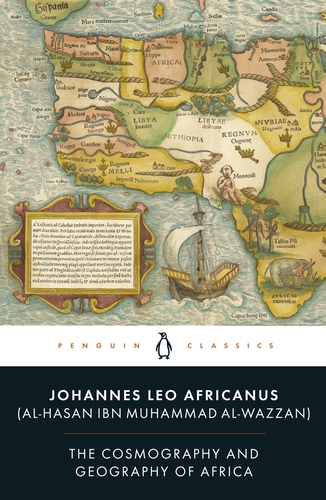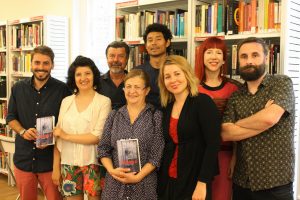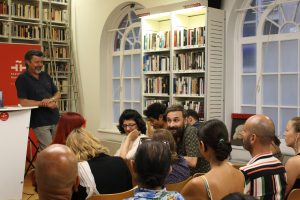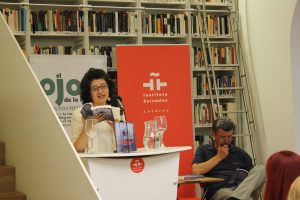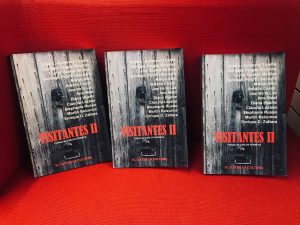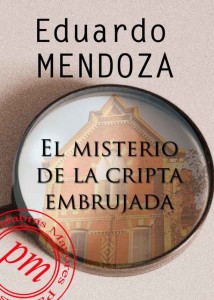The Cosmography and Geography of Africa published today
Today Penguin Classics is publishing The Cosmography and Geography of Africa, by Leo Africanus, a Moroccan diplomat born in Granada, Spain. This is the first English translation in over 400 years of one of the greatest and most influential works of Renaissance literature.
Modern and lucid, this new translation is the first based on an undiscovered manuscript unearthed in Italy on the precipice of the Second World War, and is bound to transform the way we understand contemporary conceptions of Africa.
In 1518, al-Hasan ibn Muhammad al-Wazzan, a Moroccan diplomat, was seized by pirates while travelling in the Mediterranean. Brought before Pope Leo X, he was persuaded to convert to Christianity, in the process taking the name Johannes Leo Africanus. Acclaimed in the papal court for his learning, Leo would in time write his masterpiece, The Cosmography and Geography of Africa.
The Cosmography was the first book about Africa, and the first book written by a modern African, to reach print. It would remain central to the European understanding of Africa for over 300 years, with its descriptions of lands, cities and peoples giving a singular vision of the vast continent: its urban bustle and rural desolation, its culture, commerce and warfare, its magical herbs and strange animals.
Yet it is not a mere catalogue of the exotic: Leo also invited his readers to acknowledge the similarity and relevance of these lands to the time and place they knew. For this reason, The Cosmography and Geography of Africa remains significant to our understanding not only of Africa, but of the world and how we perceive it.
A copy of this book is available in our library.
Novedades de nuestra biblioteca: Literatura gallega
Este mes de diciembre te presentamos nuestras últimas adquisiciones en literatura gallega: novela, poesía y teatro de los autores más representativos, que esperamos sean de tu interés.
Consulta el horario de nuestra la biblioteca, y ven a buscarlos, para leerlos durante las fiestas de Navidad, que te deseamos felices.
Pero antes, ¡no te pierdas las sesiones de diciembre de nuestro club de conversación y de nuestro club de lectura!
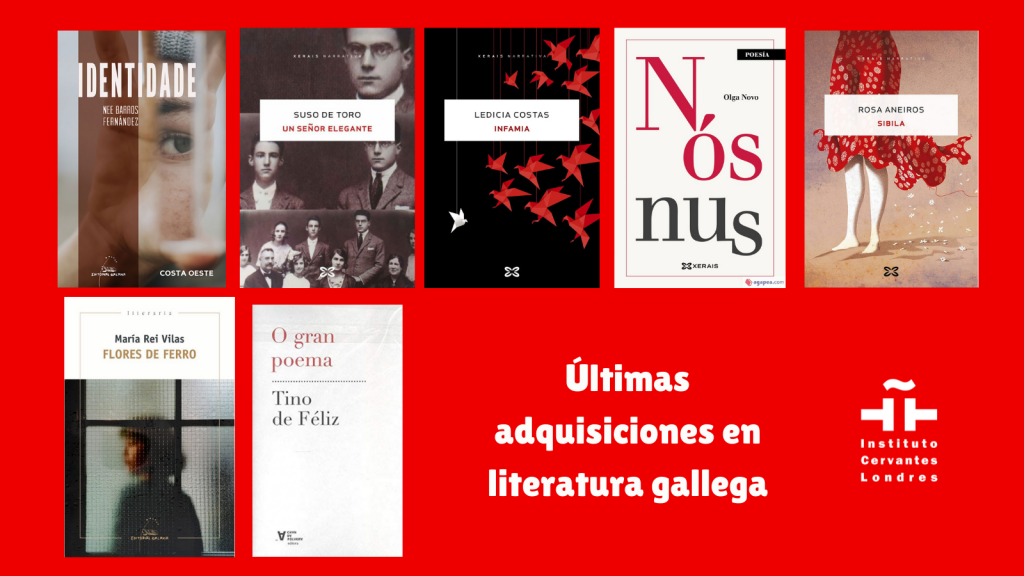
| LIBROS |
| Un señor elegante Suso del Toro A familia Baltar atesoura un sorprendente patrimonio cultural e humano. Atraído polo insólito perfil dalgún dos seus membros, o escritor Suso de Toro realiza unha indagación para reconstruír a historia dunha familia que, en distintos momentos, protexe a Rosalía de Castro e Murguía e logo á familia Castelao ou a Dieste. Tras manexar materiais froito dun intensísimo traballo de documentación, Suso de Toro ofrécenos unha novela abraiante, que aglutina unha síntese persoal de novela río, histórica, psicolóxica e novela de ideas. (+) |
| Flores de ferro María Rei Vilas PREMIO GARCÍA BARROS 2020 Camila viviu durante décadas unha mentira sostida coa complicidade dos que a rodean. No seu regreso á vila de Briana, no verán de 1987, deberá reunir o valor para enfrontarse á verdade. Alí, Antón, o ferreiro artista, pechouse no seu mundo, a arrastrar a dor e a culpa dos que non souberon ver como o mal se estendía ata que foi demasiado tarde. A visita da súa neta, Helia, vivo retrato da avoa, daralle azos para contar o que durante tantos anos calou. María Rei Vilas debuta na novela cunha historia en que a intriga asolaga tanto o persoal coma o colectivo, cun destacado protagonismo das mulleres, uns personaxes inesquecibles e unha trama onde as vítimas silenciadas poden procurar, polo menos, unhas pingas de xustiza. Aurora, Olga, Nidia… son as flores de ferro desta historia. Pero hai máis. Houbo moitas máis. (+) |
| Infamia Ledicia Costas Emma Cruz é avogada e profesora de Dereito Penal. Trasládase a Merlo para impartir clases na Universidade, sen saber que ese lugar está marcado pola desgraza. A súa chegada coincide co 25 aniversario da desaparición das irmás Giraud, dúas nenas ás que semella que tragou a terra. Emma axiña descubrirá que os habitantes de Merlo gardan segredos inconfesables, algúns deles imposibles de dixerir. Que foi das irmás Giraud? Están mortas? Se é así, quen as asasinou? Onde están agochados os seus corpos? Infamia é un thriller psicolóxico onde nada é o que parece. Unha novela de ritmo vibrante que agarra o lector e o conduce aos sumidoiros da condición humana. Unha historia de amor, odio e loucura. Fiel á súa escrita, Ledicia Costas é quen de explorar o máis recóndito da alma humana ofrecéndonos unha novela poderosa e adictiva. (+) |
| Sibila Rosa Aneiros É noite, a marea vai para arriba e chove a esmadrasar cando unha muller penetra ás agochadas nunha illa practicamente inexpugnable na boca da ría. É a neta da Rubia, a tola do argazo. A filla da expulsada. Sibila regresa ao lugar en que foi animal sen domesticar nun tempo en que todo foi seu. Agora nada ten agás a encarga dunha misión que cumprir e a terrible certeza de que lle vai a vida niso. Durante a estadía na illa irá descubrindo o salvaxe que nela habita: as tensións lacerantes entre quen é e de quen vén sendo; entre un pasado que estoura e un futuro que a aboca ao abismo; entre a ansia da mente e a vontade voraz do corpo. En «Sibila», a nova novela de Rosa Aneiros, nada é o que parece. Ou si. Talvez sexa exactamente o que parece, o que ninguén quere ve. (+) |
| Poesía reunida (1982-2004) Xela Arias O volume Poesía reunida (1982-2004) dá conta da obra poética de Xela Arias e quere contribuír á súa difusión e coñecemento. A escritora ocupou un lugar de seu na cartografía literaria das últimas décadas e a súa obra está en consonancia coa renovación do discurso poético producida dos anos 80 en diante, así como coa proliferación dos discursos do feminismo, aos que acompañou como pioneira. Xela Arias, que manifestou en numerosas ocasións un sentimento de soidade xeracional, reivindicou a condición de muller escritora e reaccionou con contundencia contra o carácter invisibilizador das etiquetas. Para ela, a poesía era «un trato coa búsqueda da vida poderosamente iluminada». (+) |
| Nós nus Olga Novo Nós nus é unha mestura de líquidos íntimos que tiran do poema coma dun becerro. Os deste libro son versos que levan o erotismo do corpo, do sacho e do alpendre no seu útero de bruxa. A autora abriu as coxas e pariu a verba. (+) |
| O gran poema John Tino de Féliz No ano 2011, Constantino Bértolo asomouse uns minutos ao outro lado da morte e cando regresou tiña o corpo ateigado de saudades e nostalxias. Volveu a mirada cara ás súas orixes e reencontrouse con Tino de Féliz, o rapaz que el fora, e co galego engastado á lingua. Aí comeza a escribir O gran poema. A tectónica básica foi a terra movéndose baixo os seus pés e a sensación de amor extraviado, de formar ou querer formar parte do destino que o río Navia metaforiza como río que nos leva e río que nos trae. A necesidade de crear e salvar ese mundo e o tempo perdido. De volver ao ser, ese río Ser que aflúe ao Navia e o fai medrar. Habería que falar por tanto —asegura o autor— de tectónica e de canle, de erosión e de permanencia. El, como lector que contempla con reserva os versos do diálogo coas intimidades, sempre arelaba a poesía escrita en voz alta e, de súpeto, o corpo, a voz e a presenza da morte fixérono sentir claramente que o son desa voz alta só era posible en galego. (+) |
| Identidade Nee Barros Fernández Unha obra de teatro que fala da liberdade, da necesidade de ser e, sobre todo, da identidade. O simple acto de nacer marca a nosa vida nun molde que a sociedade se encarga de contornar e puír. Mais, que pasa se nacemos nun molde equivocado? Zé, o noso protagonista, vive unha historia chea de valentía, loitando a contracorrente por construír a súa propia identidade. Coa complicidade dos seus amigos e a súa familia, percorrerá un camiño en que moitas vendas negras, que tapan os ollos e a alma, caerán ao chan. Rompendo todos os moldes, Zé será quen de amosarlle a todas as persoas que dá igual como te vexan os demais. O máis importante é como nos sentimos nós, ser quen queiramos ser e seguir sempre o que dite o noso corazón. |
Our new e-book platform is ready / La nueva plataforma de préstamo electrónico está lista
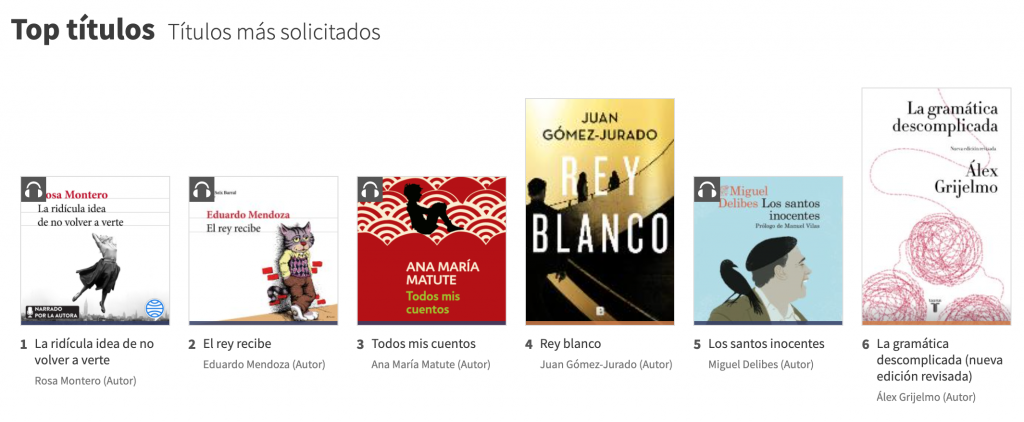
We are pleased to inform you that we have now completed the setup tasks for the new e-book platform. Although 100% of the content has not yet been migrated, you can now explore the new interface and familiarize with the new features. We hope to finish incorporating all titles shortly.
If you access the platform through a mobile device (phone or tablet) you must uninstall the old application and install the new one that is already available in the Google Play and App Store stores under the name BIBLIO-E INSTITUTO CERVANTES.
– App Store: http://icerv.es/Z44
– Google Play: http://icerv.es/Z4J
If you are accessing from a computer and managing your electronic loans with Adobe Digital Editions, you must create a new Adobe ID as it is a different platform.
If you need further assistance, please contact our customer service centre at https:/cau.cervantes.es/ or send us an email: biblon@cervantes.es

Nos complace informaros que ya hemos finalizado las tareas de configuración de la nueva plataforma de préstamo electrónico. Aunque todavía no se ha migrado el 100% de los contenidos, ya puede explorar el nuevo interfaz y familiarizarse con las novedades de uso. Esperamos terminar con la incorporación de todos los títulos en breve.
Si accedes a la plataforma a través de un dispositivo móvil (teléfono o tableta,) debe desinstalar la antigua aplicación e instalarse la nueva que ya está disponible en las tiendas de Google Play y App Store con el nombre de BIBLIO-E INSTITUTO CERVANTES.
– App Store: http://icerv.es/Z44
– Google Play: http://icerv.es/Z4J
En caso de acceder desde un ordenador y gestionar los préstamos electrónicos con Adobe Digital Editions, deberás crear un nuevo ID de Adobe al ser una plataforma diferente.
Si necesitas ayuda, estamos a tu disposición en nuestro centro de atención al usuario en:
https:/cau.cervantes.es/ o escríbenos a biblon@cervante.es
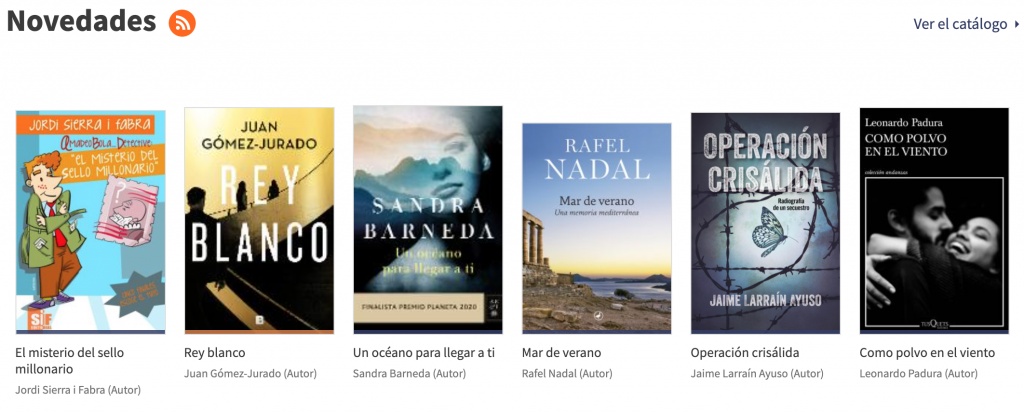
Romancero Books, una librería en Londres de literatura editada en España y Latinoamérica

Jorge Gárriz reside en Londres desde hace algo más de diez años. Es un gran apasionado de la lectura, el cine y las artes en general. Durante los últimos 15 meses ha estado trabajando en un proyecto cultural: abrir en Londres una librería de literatura editada en España y Latinoamérica. El nombre escogido es Romancero Books.
Debido a la pandemia de la COVID-19, el proyecto ha dado un giro de 180 grados y por el momento la librería vende en línea. En un futuro, espera que cercano, le gustaría poder vender también en espacios físicos como cafés, organizaciones culturales españolas con sede en Londres, teatros y tiendas de comida española hasta poder hacer su sueño realidad, abrir su propia librería-café-espacio cultural y de eventos.
Gárriz estudió la licenciatura de Bellas Artes en Valencia y Bilbao, y desde que vive en Londres ha trabajado para estudios de arquitectura organizando eventos culturales y forma parte del equipo de programadores del festival de cine queer Fringe! y del colectivo artístico Strange Perfume, encargándose de organizar la feria de libros queer en la South London Gallery.
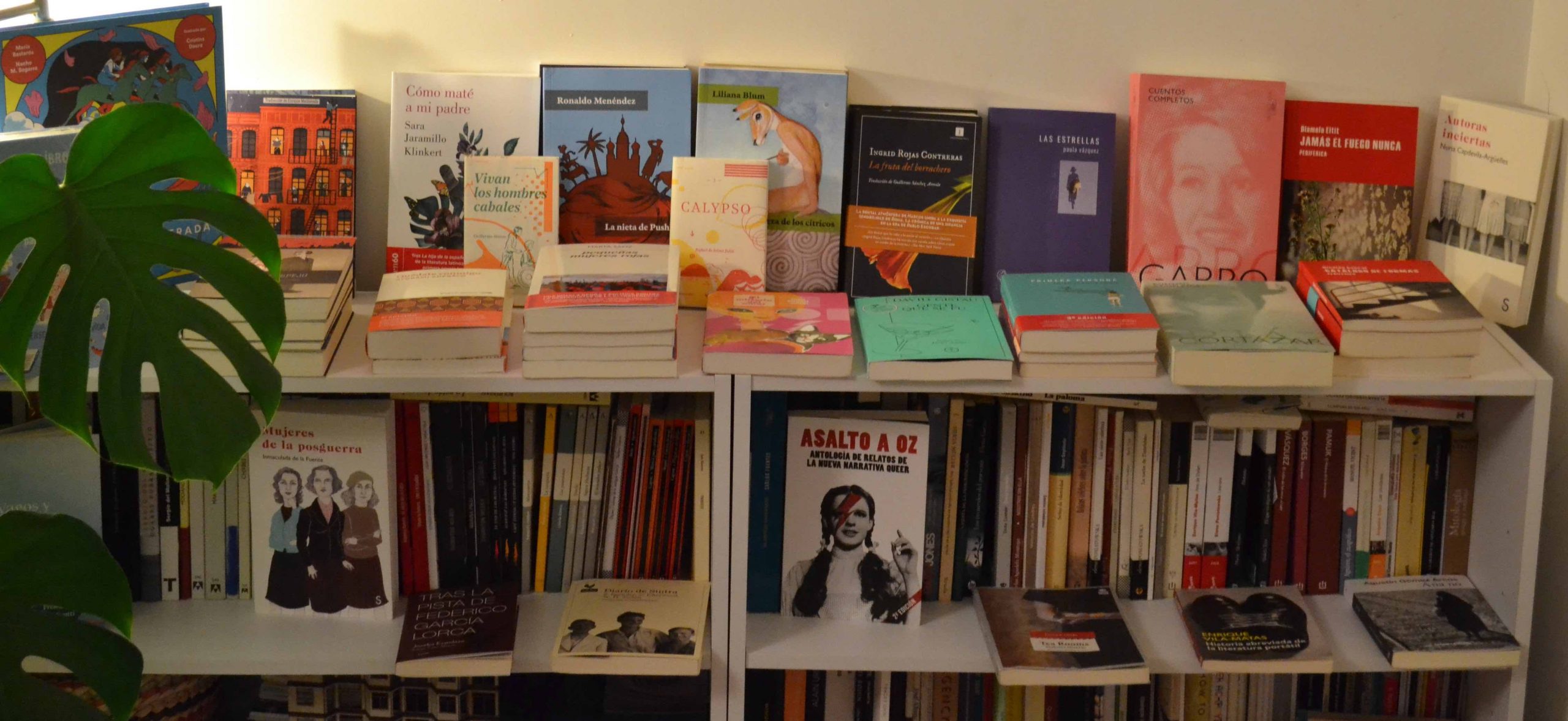
¿Cómo surge Romancero Books?
El proyecto de abrir esta librería surge por una necesidad personal y es la de tener acceso a libros publicados en España en Londres. En Reino Unido no es fácil conseguir libros en español y sobre todo es difícil conseguirlos a un precio no desorbitado. Soy un apasionado lector y cada vez que he ido de vacaciones a la península, mi maleta siempre ha vuelto con muchos libros dentro. Hablando con amigas que también son ávidas lectoras, me di cuenta que ellas estaban en la misma situación y les comenté la idea, idea que todas apoyaron, además de ofrecer ayuda con en diseño de la web, los contactos en el sector editorial español, etc.
Por otro lado y debido a mi experiencia trabajando en eventos en Londres, siempre he soñado con la idea de tener un espacio donde poder organizar exposiciones, charlas y talleres. Estudié Bellas Artes y me apasiona acudir a openings, presentaciones de libros o conferencias y siempre he sido un social butterfly, por lo que si juntamos libros, eventos culturales y poder recomendar lecturas, tenemos el coctel perfecto.

¿Qué libros y autores se pueden encontrar en vuestra librería?
En nuestra librería tenemos un amplio catálogo con secciones específicas como Universo Lorca, donde vendemos los libros escritos por Federico García Lorca y libros que hablan sobre él y su obra, como Lorca en Buenos Aires escrito por Reina Roffé o el epistolario entre Lorca y Dalí publicado por la editorial Elba.
Nuestro catálogo de novedades, que no solo se ciñe a las novedades de cada semana o mes sino que también acoge los libros reeditados por las editoriales que fueron novedad hace unos meses o hace años, como Canto yo y la montaña baila de Irene Sola o la novela escrita por Elena Garro, Recuerdos del Porvenir escrita en los años 60 y reeditada este año por Alfaguara. Por supuesto, también tenemos los últimos libros publicados por Tránsito, Barrett, Automática Editorial, Libros del Asteroide, Periférica y un largo etcétera. De hecho hacemos una gran labor en dar a conocer los libros publicados por editoriales pequeñas e independientes.
Otras secciones disponibles son Nuevas voces LGTBI con libros de las editoriales Dos Bigotes (Ariel y los cuerpos), Niños Gratis* (Salvemos la Jarapa) o Cabaret Voltaire y sus maravillosos libros de Luis Antonio de Villena y Abdelá Taia. O las dedicadas a las Escritoras de la Generación del 27 y a la Literatura del Exilio, con libros de María Teresa León, Luisa Carnés o Mada Carreño.
¿Cómo veis el mercado británico? ¿Hay interés por la literatura editada en España y Latinoamérica?
En el Reino Unido vivimos más de 140.000 ciudadanos españoles y esto es solo el dato oficial del INE. Por otro lado están todos los estudiantes y apasionados británicos de nuestras lenguas, más todas las personas de países latinoamericanos que también reclaman poder leer a sus autores en Reino Unido. Con todos estos datos, puedo confirmar que sí que existe una necesidad e interés en conocer que es lo que se está escribiendo en el mundo Hispano, como ejemplo puedes ver las traducciones al inglés en Fiztcarraldo Ediciones y Charco Press.

Recomienda por favor a nuestros lectores 5 títulos de tu librería
– Alpinismo Bisexual de Simón Elías
– Ana No de Agustín Gómez Marcos
– La Isla de Java de Elizabeth Mulder
– Descendientes de Nicolás Muñoz
– Las Estrellas de Paula Vázquez
¿En qué proyectos estáis trabajando a corto y largo plazo?
Acabamos de grabar una serie de charlas literarias organizadas en colaboración con la oficina de la AECID y la Embajada de España que est’an siendo emitidas en su canal de YouTube. También estamos cerrando fechas para organizar nuestro primer evento de venta directa en un espacio localizado en el este de Londres, donde por fin podré conocer a nuestros lectores.
Y a la vez seguimos creando lazos con nuevas editoriales, autores y profesores para organizar coloquios virtuales hasta que por fin podamos organizar una presentación de un libro de forma presencial.
Instituto Cervantes in London celebrates World Book Day with the reading of ‘10 Poems of Love and A Confined Song’

Instituto Cervantes in London joins the World Book Day celebrations with a reading of ’10 Poems of Love and A Confined Song’ by founder and Artistic Director of the Cervantes Theatre, Jorge de Juan. He will be joined by singer María de Juan and the event joins the list of celebrations for the 2020 Cervantine Week. It will be a week of multiple online initiatives based on all aspects of culture from books, libraries and bookstores to the publishing world, and it is open to everyone to join in and celebrate.
Having just released their new album ‘24/7’, Jorge de Juan and María de Juan come together tonight from their current locations of London and Granada, respectively. Jorge will read poems by Alfonsina Storni, Pablo Neruda, Carmen Conde, Joan Margarit and Luis García Montero among others, whilst María will sing a poem by Mario Benedetti accompanied (from Seville), by Andrés Barrios – pianist and composer who fuses world music in combination, such as flamenco and jazz. In addition, the video transmission will include photos of the journalist Jorge Pastor Sánchez, taken in Granada under the state of alarm in March 2020. The Cervantes Theatre, in collaboration with the Instituto Cervantes in London, hosts this soirée as a message of love and unity during this global pandemic.
The director of Instituto Cervantes in London, Ignacio Peyró, underlined the importance of celebrating World Book Day and Sant Jordi: “Normally on a day like today, we would be giving roses and books at our centre and celebrating reading, literature and ‘The Quixote’. This year is different, but we have made an extraordinary effort so that, although they are not face-to-face and even though they are more modest this year, our cultural activities continue to have variety and quality. In other words, they offer new, relevant and curated content by us”.
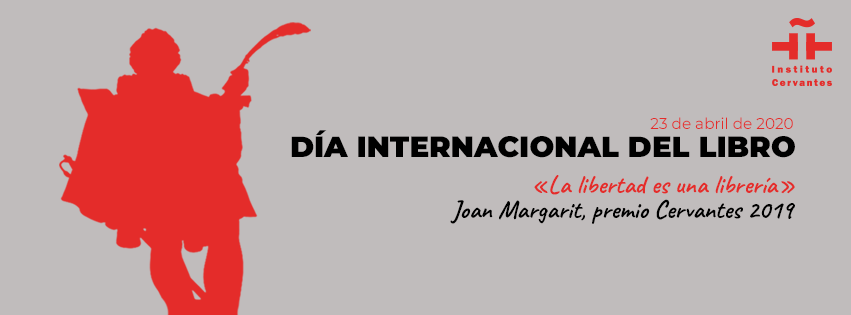
2020 Cervantine Week
Instituto Cervantes offers multiple cultural initiatives open to the public in the framework of the celebration of World Book Day, today April 23rd. With meetings with writers such as Lorenzo Silva, Elvira Lindo and Isabel Coixet, free audiobooks, the opinions and talks of more than 70 outstanding professionals in the world of culture and readings of passages from ‘Don Quixote’, among others.
The range of online projects offered today is epitomised by the verse title of the 2019 Cervantes Award winner, Joan Margarit: ‘Freedom is a bookstore’. The Cervantine Week aims to bring home, at this stage of confinement, the best of our book culture as well as promote reading and the celebration of authors, publishers and booksellers.
Even though the Instituto Cervantes in London was forced to close in response to the British government guidelines on COVID-19, our mission and cultural programmes continue online.
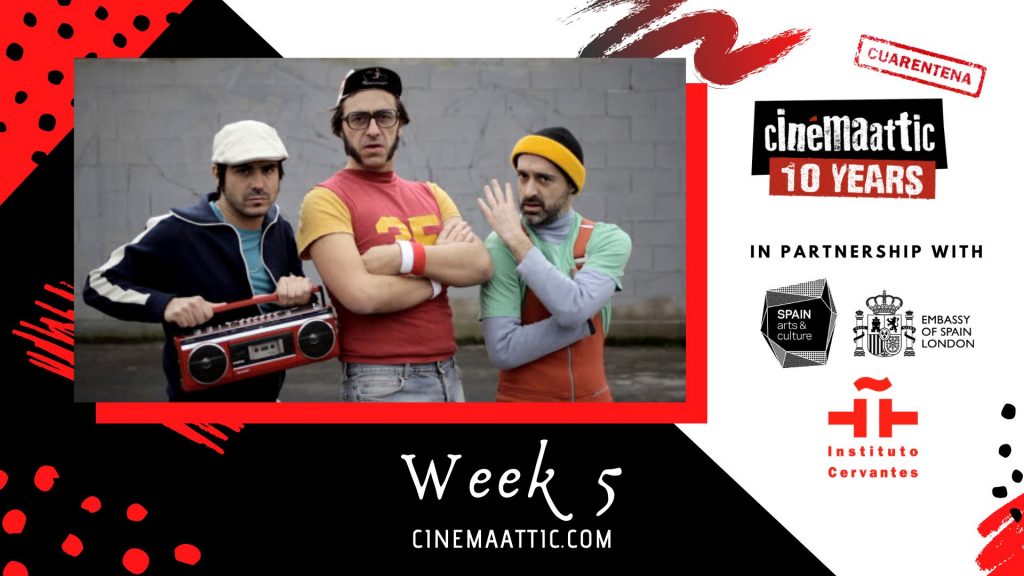
The Best Spanish Short Films with CinemaAttic
Every Monday, CinemaAttic and Instituto Cervantes in London, Manchester and Leeds share a weekly programme of ‘Seven Essential Short Films of the Last Decade of Spanish Cinema’. The whole thing is entirely free and accessible with English subtitles. The program is available until Sunday on both the CinemaAttic website and the Facebook event where you can also vote for your favourite shorts and comment. In addition, every Sunday at 1pm, we end the week together with ‘A Vermouth with CinemaAttic’: an online event on Facebook where a selection of the short films’ directors are interviewed.

Visual Arts: Amalgama 2020 Program
Amalgama is the first cultural initiative dedicated to promoting the work of Ibero-American female artists in the United Kingdom and will run from April to June. Amalgama, in collaboration with Instituto Cervantes in London, proposes a series of videos to present its 2020-2021 programme.
Amalgama aims to strengthen the relationship between the British public and the international art scene regarding the work of female artists from Latin America, Spain and Portugal. This year’s programme will include two exhibitions (a group show and a solo exhibition) displaying the artists’ research on the tension between nature and culture in the digital age.
The exhibitions include 15 artists, ranging from Argentina, Brazil, Chile, Colombia, Spain, Portugal and Venezuela. Each artist included in the final product was specially selected from the 190 applicants in an open call. For the second show, Amalgama will present the work of renowned Colombian artist Maria Elvira Escallon who was nominated for the Luis Caballero Prize in 2019.

Spanish Cinema Snippets with Joana Granero
Also available are a series of short introductions to Spanish cinema. They include presentations across a wide array of subjects, hosted by Joana Granero, Director and Founder of the London Spanish Film Festival. Each one focuses on a specific new or archival film on the work and career of leading names in Spanish cinema as well as artistic movements and schools.
In session one, Granero talks about José Luis Cuerda; filmmaker, screenwriter and producer. In session two, she will talk about a successful case: ESCAC. ESCAC, Escola Superior de Cinema i Audiovisuals de Catalunya, where teamwork and crossing barriers are primary guidelines. They have produced some of the most interesting and fresh productions over the last few years.

Literary podcasts with The Eye of Hispanic American Culture
April’s literary podcasts are produced by The Eye of Hispanic American Culture and led by Enrique Záttara who is responsible for the project. They include central figures such as the Spanish poet, professor and director of Instituto Cervantes, Luis García Montero and the Argentine novelist Mariana Enríquez.
The Eye of Hispanic American Culture is a multimedia, international and bilingual cultural project, based in London. Its objective is to promote the Hispanic-American culture residing in Europe and across the globe by connecting and informing artists, writers and intellectuals.

Great Spanish and Ibero-American composers season
Additionally, the Iberian & Latin American Music Society (ILAMS) and Instituto Cervantes in London present a series of podcasts which bring the life and work of the most representative Spanish and Ibero-American composers to life. The podcasts are released on a monthly basis and celebrate the rich musical tradition of our countries.
Ray Picot, concert reviewer at ILAMS and writer of a popular monthly column for Echoes Magazine, will focus on the masterpieces of Enrique Granados, who was one of a triumvirate of great Spanish composers to achieve international acclaim during the early 20th century.
Libros para niños de 6 a 8 años (I) – Books for children from 6 to 8 years (I)
After having started school at 4, most children yearn to read on their own by the ages of 6 or 7. For this special time, we suggest a range of different books from our library:
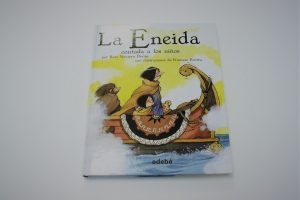
La Eneida Contada A Los Niños de la autora Rosa Navarro Duran y el ilustrador Francesc Rovira. La Eneida es un relato de aventuras, de amores y de guerras. Leyendo La Eneida podremos conmovernos con el dolor de la bellísima reina Dido cuando Eneas se marcha, sufrir por la suerte de las naves del troyano en medio de las tempestades, o asistir a su impresionante combate con el rey Turno. Veremos a Iris, dibujando su arco en el cielo cuando Juno la envía con sus mensajes perversos, porque fue esta poderosa diosa la gran enemiga de Eneas.
The Aeneid, as retold for Children by author Rosa Navarro Durán and illustrator Francesc Rovira. The Aeneid is a tale of adventures, love and war. Reading the Aeneid, we will be moved by the pain of the beautiful queen Dido when Aeneas departs, to suffer the fate of the Trojan vessels in the thick of the tempests, or to attend his incredible combat with king Turnus. We will see Iris, drawing her bow in the sky when Junus sends her his hateful messages, because this powerful goddess was Aeneas’ great enemy.
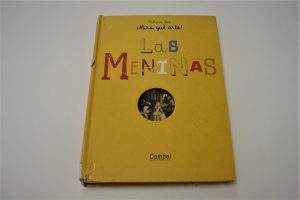
¡Mira que arte! Las Meninas (¡Mira qué arte!) de la autora e ilustradora Patricia Geis Conti. Es una colección de libros que combinan historia del arte con imágenes, espectaculares pop-ups y actividades divertidas para descubrir las obras más célebres de todos los tiempos. Después de La Mona Lisa, ponen al alcance de los pequeños uno de los cuadros más enigmáticos de la historia del arte: Las Meninas, de Velázquez.
Las Meninas by author and illustrator Patricia Geis Conti. It is a collection of books that combine art history with images, spectacular pop-ups and fun activities to discover the most famous works of all time. Our particular favourite comes after the Mona Lisa, and is one of the most enigmatic paintings in art history within reach of the little ones: Las Meninas, by Velázquez.
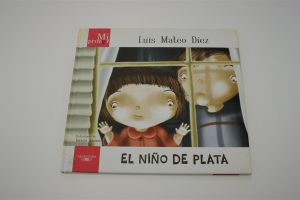
Mi Primer Luis Mateo Díez. El niño de plata. En la colección de literatura infantil «Mi primer» los grandes de la literatura se enfrentan al público más exigente… ¡los pequeños lectores!
My First by Luis Mateo Díez. The silver kid. In the collection of children’s literature called «My first» the greats of literature face the most demanding public … small readers!
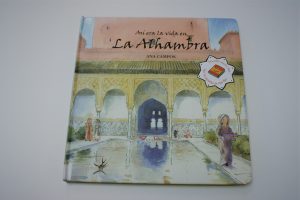
Así era la vida en la Alhambra de la autora Ana Campos. La Alhambra es una ciudad árabe medieval que ha llegado increíblemente bien conservada a nuestros días. Este libro ayudará a comprender cómo era la vida en la Alhambra en el siglo XIV. Descubre como era el interior de las torres o los cuartos de baño. Sumérgete en una cultura antigua que nos ha dejado un legado único.
That was life in the Alhambra by author Ana Campos. The Alhambra is a medieval Arab city that is still incredibly well preserved today. This book will help children to understand what life was like in the Alhambra in the fourteenth century. Discover what the interiors of the towers or even the bathrooms were like… Immerse yourself in an ancient culture that has left us a unique legacy.
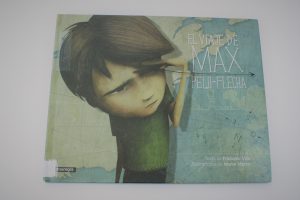
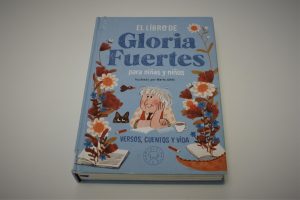
El libro de Gloria Fuertes para niñas y niños de Gloria Fuertes, con el escritor Jorge Cascante y la ilustradora Marta Altés. Esta edición única profusamente ilustrada por Marta Altés, nuestra ilustradora de mayor proyección internacional, incluye: – Un prologo escrito por Gloria Fuertes a mediados de los 80 para una antología que jamás se publicó. – Cartas de las niñas y niños que Gloria recibió a lo largo de los años en su buzón. – Una carta abierta a todos los maestros firmada por la poeta. – Una selección de algunos de los poemas escritos por las niñas y niños que participaron en el Premio de Poesía Infantil Gloria Fuertes a lo largo de todas sus ediciones.
The Book of Gloria Fuertes for girls and boys by Gloria Fuertes, plus writer Jorge Cascante and illustrator Marta Altés. This unique edition, bountifully illustrated by Marta Altés, our illustrator with the greatest international projection, includes: – A foreword written by Gloria Fuertes in the mid-80s for an anthology that was never published. – Letters from the girls and boys Gloria received over the years in her mailbox. – An open letter to all teachers signed by the poet. – A selection of some of the poems written by the girls and boys who participated in the Gloria Fuertes Children’s Poetry Prize throughout all its editions.
London opens the door to literature in Spanish language
Instituto Cervantes in London welcomes the presentation of a book celebrating twelve Spanish and Latin American authors living in the British capital.
Twelve Spanish-language authors from Argentina, Bolivia, Uruguay, Mexico, Nicaragua, Spain and Ecuador will speak today at 7pm at the London headquarters of Instituto Cervantes. All the writers now live and work in London, and their new book, Visitors II was written after attending the creative writing workshop, El Ojo de la Cultura Hispanoamericana (The Eye of Hispanic American Culture).
«London is a literary and creativity capital in Spanish because of the number of Spanish speakers who create in it,» says Ignacio Peyró, director of the Cervantes Institute in London, who highlights the Latin American vocation of the centre.
The twelve Spanish and Latin American authors are: José Luis Gutiérrez Trueba, Denisse Vargas Bolaños, Lester Gómez Medina, Santiago Peluffo Soneyra, Marijo Alba, Natalia Casali, Jael de la Luz, Ana Vidal, Diana Huarte, Claudia Lozano, Stephanie Russo and Martín Belzunce, coordinated by the Argentine writer Enrique D. Zattara.
All of them will talk about their work and their experience after attending the writing workshop that Zattara started in September 2015 and through which thirty writers have attended both face to face or online.
The Eye of Hispanic American Culture, ZTR Radio and Instituto Cervantes in London have been collaborating together since October 2017 in the “Authors in search of reader” cycle, aimed at spreading the work of Spanish-American writers still little known in this country among the British readers.
Writing workshops to improve stories
Zattara highlights the role of writing workshops to help writers, through the development of techniques and resources to improve the story and going through what will work or not. In addition, he explains how they disassemble the stories and resources used by writers such as the Argentine Jorge Luis Borges.
“Ricardo Piglia said that the first writings were particularly interesting because they were portrayed in the search for a style and the commitment to a way in which to think about literature”, says writer Carlos Fonseca, author of the prologue in this book. «The beauty of a book like this falls, then, on that style and form are thought collectively.»
In the case of the writer Lester Gómez Medina, a Costa Rican of Nicaraguan origin, four of his short stories are included. In them, he gathers his childhood experiences and how they impact on adult life. Gómez Medina highlights the role of the workshops as a speaker of the Spanish language in London, as well as to consolidate the writing and create a link with other writers to whom he already calls friends.
On the other hand, Diana Huarte, Argentine singer of electronic music of the group called Shh, arrived at the writing workshop two years ago after a health problem and eager to develop her creativity. In addition, the Cantabrian José Luis Gutiérrez Trueba joins the project with his stories, inspired by ideas that he takes from the street, news he is reading throughout the day, reflections of the current era and the impact of social networks and Brexit.
A project to spread to Spanish-speaking creators
The Eye of Hispanic American Culture in London is a multimedia cultural project that aims to communicate and disseminate with Spanish-speaking artistic creators worldwide. They develop their motives through various formats, such as radio culture, through ZTR radio podcasts in which they carry out exclusively cultural programming in Spanish and English, which is also broadcast live in collaboration with ExraRadio1 of London.
In addition, they make cycles, readings and conferences for the dissemination and knowledge of Hispanic-American artists, in Spanish and English. These projects are both lone-ventures as well as in collaboration with institutions such as the Cervantes Institute, various Latin American Embassies, and some universities. They also organise public shows where they stage encounters of artistic disciplines such as poetry, music and dance, theater, cinema for the audience.
Nueva tarea en el Club Virtual de Lectura – New Virtual Reading Club assignment
Les invitamos de nuevo a formar parte del Club Virtual de Lectura del Instituto Cervantes. ¡Disfrutará enormemente!
Se trata de un servicio que ofrece compartir opiniones con otros usuarios de bibliotecas del Instituto Cervantes de todo el mundo en torno a una obra de la literatura española o hispanoamericana a través de una plataforma de lectura en Internet, y que funciona de modo similar al de las redes sociales.
Requisitos:
-Dominio del español;
-Tener vigente el carné de biblioteca.
La próxima lectura será del 4 al 15 de mayo: «El misterio de la cripta embrujada», de Eduardo Mendoza
(del 4/5/2015 al 15/5/2015)
Para más información, consulte la normativa del Club Virtual de Lectura o escriba a club.virtual.lectura@cervantes.es.
¿Cómo inscribirme? Tutorial de acceso
____________________________________________________
We insist: come join the Instituto Cervantes Virtual Reading Club. You will enjoy tremendously!
The aim of this service is to provide an environment where you can share your views on a given Spanish or Latin American Literature title with other Instituto Cervantes library members across the world, via an Internet reading platform. It works in a similar way to social media networks.
Requirements to join:
-to be fluent in Spanish;
-to have a valid Instituto Cervantes Library card.
Next reading will take place 4 to 15 May: El Misterio De La Cripta Embrujada, by Eduardo Mendoza
(4/5/2015 – 15/5/2015)
For further information, please check the Virtual Club regulations or write to club.virtual.lectura@cervantes.es.
How to register? Tutorial
Recomendaciones navideñas y cierre
El próximo 20 de Diciembre el Instituto Cervantes cerrará sus puertas por Navidad y Año Nuevo hasta el día 4 de Enero.
Hasta ese momento, aquí os dejamos una guía de lectura con nuestras recomendaciones navideñas.
!Felices fiestas!
[scribd id=45425311 key=key-2manw9a7zd93vehndqjd mode=list]
Las mejores novelas en español de los últimos 25 años
 En el año 2007 un grupo de especialistas (escritores, editores y críticos literarios) seleccionó las 100 mejores novelas en lengua española del último cuarto de siglo. La lista fue publicada en diversas fuentes. El puesto número uno está ocupado por la obra «Amar en tiempos de cólera» de Gabriel García Márquez. Le siguen «La fiesta del Chivo» de Mario Vargas Llosa en el segundo puesto y «Los detectives salvajes» de Roberto Bolaño en el tercero. Tanto de este escritor chileno como del español Javier Marías, se incluyen dos novelas entre los diez mejores puestos.
En el año 2007 un grupo de especialistas (escritores, editores y críticos literarios) seleccionó las 100 mejores novelas en lengua española del último cuarto de siglo. La lista fue publicada en diversas fuentes. El puesto número uno está ocupado por la obra «Amar en tiempos de cólera» de Gabriel García Márquez. Le siguen «La fiesta del Chivo» de Mario Vargas Llosa en el segundo puesto y «Los detectives salvajes» de Roberto Bolaño en el tercero. Tanto de este escritor chileno como del español Javier Marías, se incluyen dos novelas entre los diez mejores puestos.
La lista puede consultarse a través de las siguientes direcciones:
Semana: http://www.semana.com/wf_InfoArticulo.aspx?IdArt=101793
El País: http://www.elpais.com/articulo/cultura/mejores/novelas/espanol/elpepicul/20070326elpepicul_4/Tes
Desde la biblioteca del Instituto Cervantes de Londres queremos animar a nuestros usuarios a leer estas grandes obras de la literatura en lengua española. A continuación, incluimos enlaces de las 3 pimeras obras de la lista en nuestro catálogo:
